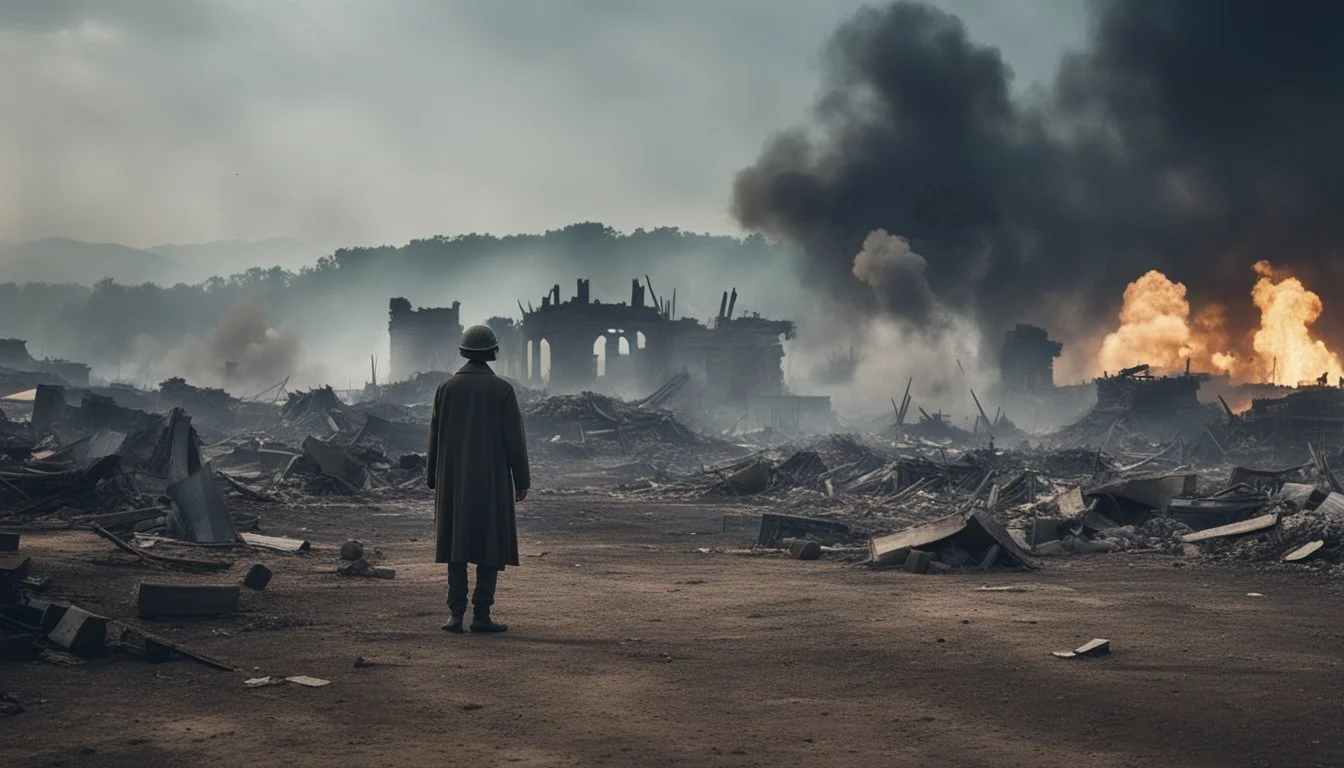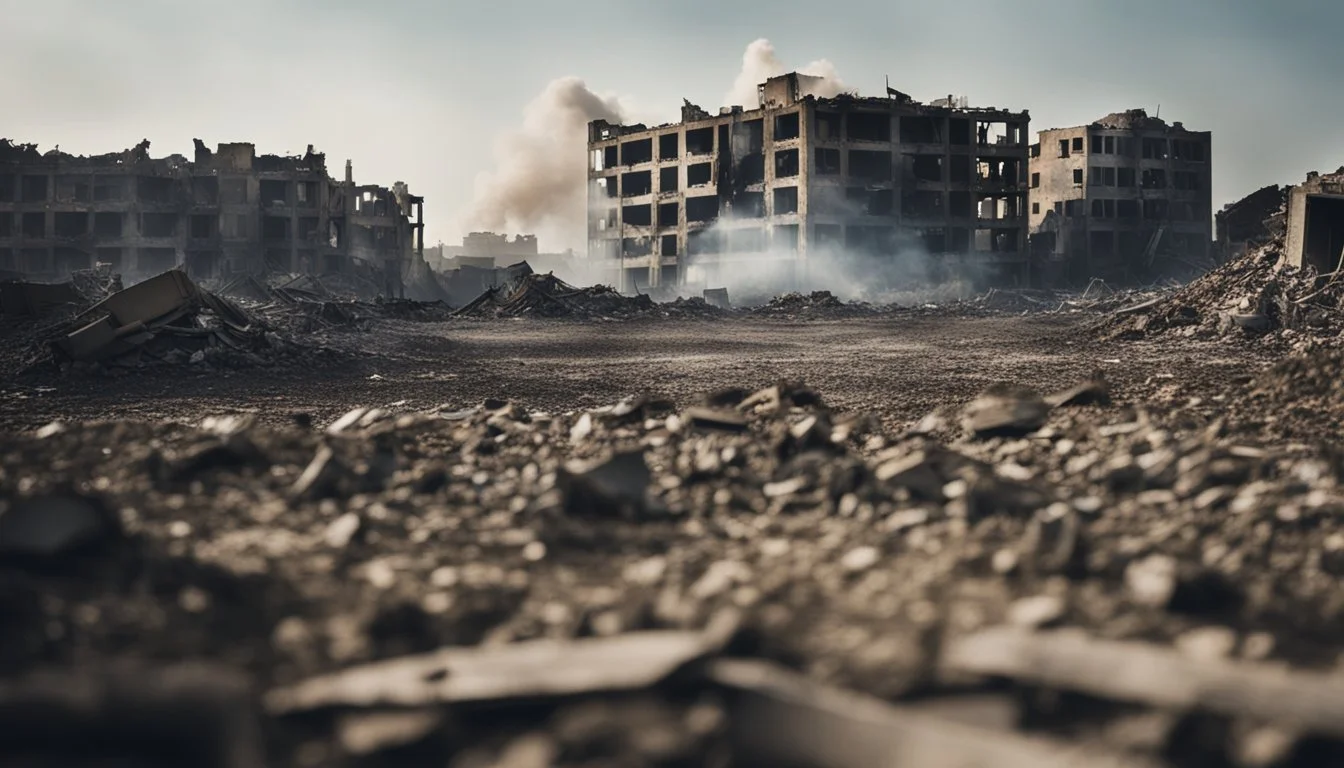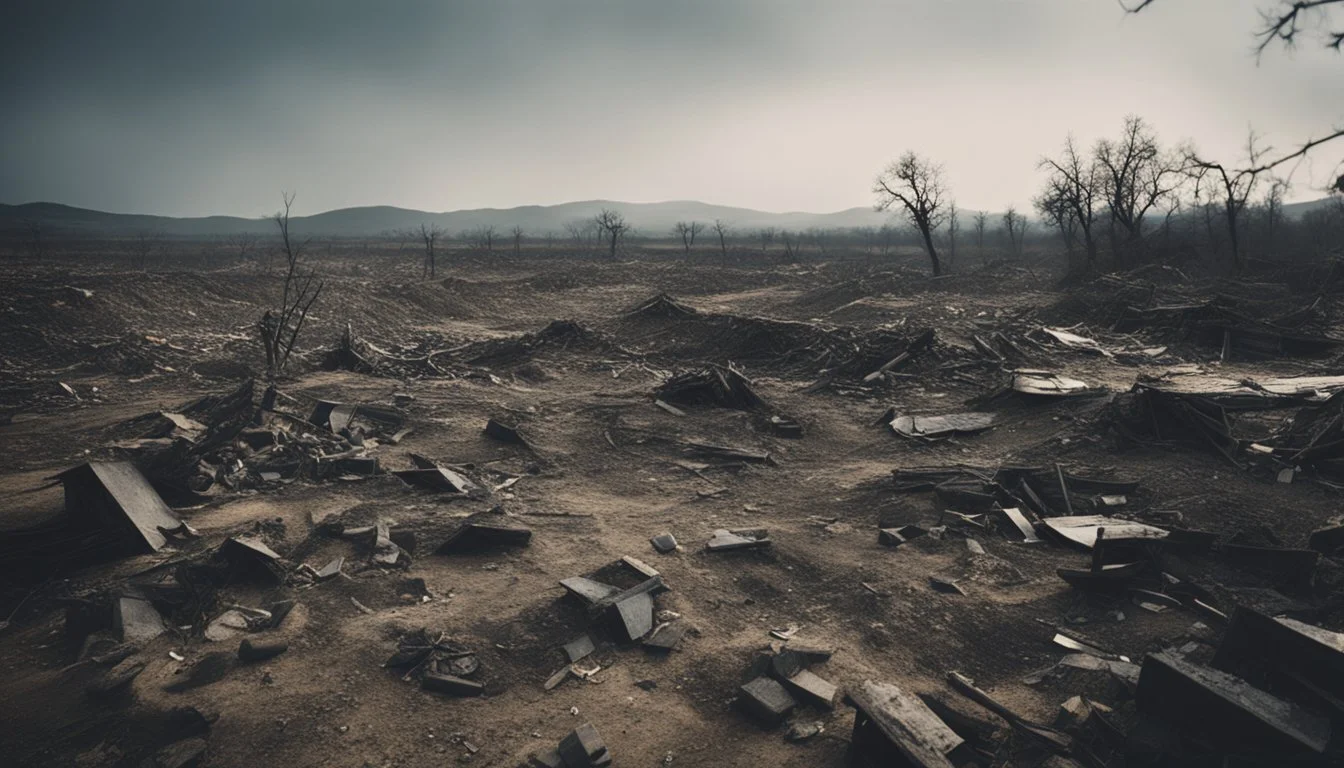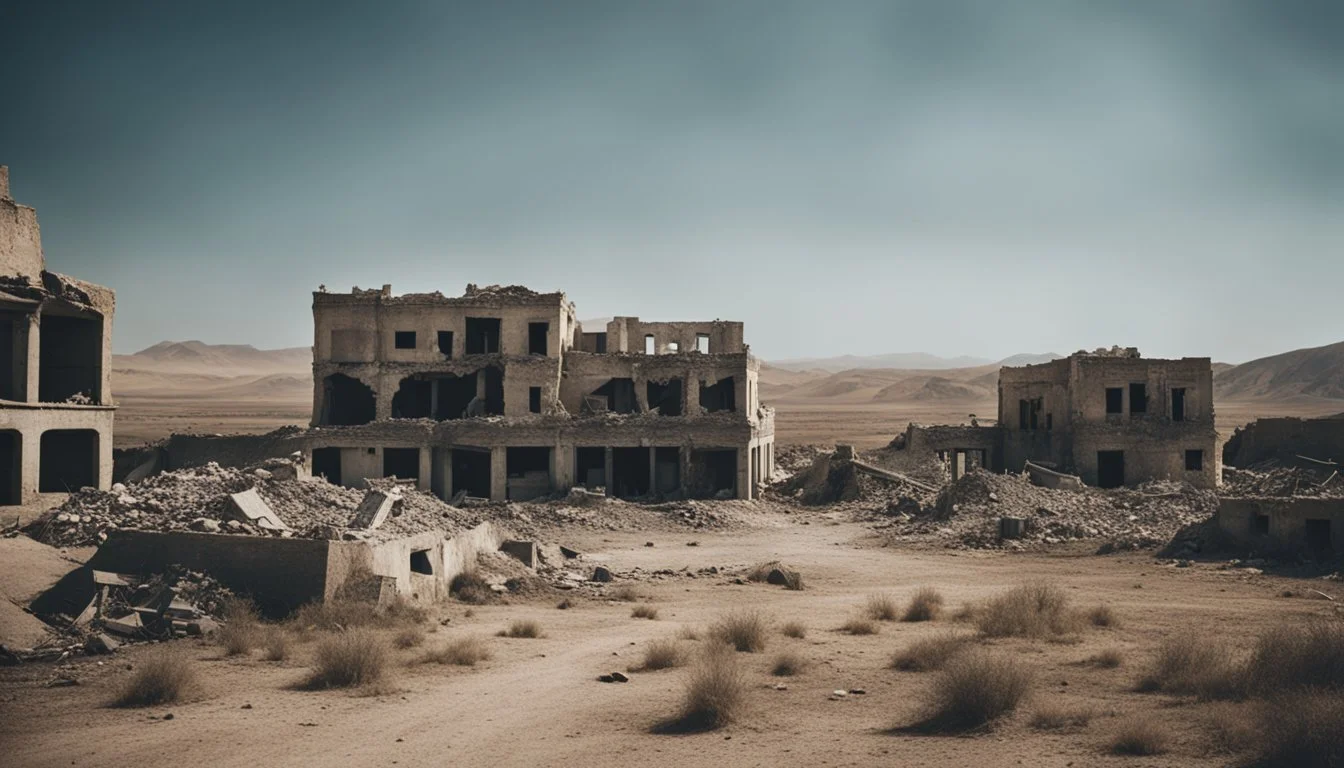Peter Davis: Confronting the Horrors of War and Its Aftermath in Modern Times
Peter Davis stands as a pivotal figure in documentary filmmaking, especially known for his unflinching approach to confronting the horrors of war. His landmark documentary, "Hearts and Minds," piercingly examines the United States' involvement in the Vietnam War, shedding light on the profound impacts on both soldiers and civilians. Through a blend of interviews and raw footage from the battlefield and home front, Davis crafts a compelling narrative that forces viewers to face the brutal realities of conflict.
This tableau of war and its aftermath is not just a historical recount but a mirror reflecting the emotional and societal ripples caused by the Vietnam War. The use of personal stories, combined with stark visual documentation, illustrates the heightened sense of desperation and hope intertwined in such times. This approach highlights the complex interplay between government policies and the human experiences they shape.
By capturing these multifaceted perspectives, Davis invites a deeper reflection on the nature of war and its enduring legacy. His work serves not only as a powerful documentation of historical events but also as a timeless appeal for understanding the full spectrum of its impact. The affective depth and honesty in "Hearts and Minds" continue to resonate, reminding audiences of the relentless cost of war on a very human level.
Life and Background of Peter Davis
Peter Davis, best known for his landmark documentary Hearts and Minds, has a multifaceted background that shaped his perspective on war and society. His early life and education, experiences during the Vietnam War, and his post-war career have all influenced his work and advocacy.
Early Years and Education
Peter Davis was born in Santa Monica, California. His parents were screenwriters, which exposed him early on to storytelling and the film industry. Davis pursued his education passionately, attending prestigious institutions.
He graduated from Harvard University, where he first developed his analytical approach to societal issues. His academic background laid the foundation for his future work, combining rigorous research with deep empathy for his subjects.
Military Career
During the Vietnam War, Davis was drafted into the U.S. military. He served as a correspondent, an experience that profoundly shaped his worldview. Witnessing the war's brutality and the complexities of military life, Davis began to question official narratives.
These experiences informed his later work and philosophy, emphasizing the importance of an adversarial relationship between the press and government to maintain accountability.
Post-War Life
After his military service, Davis transitioned into filmmaking. His documentary Hearts and Minds, released in 1974, critically examined the Vietnam War and its impact on both American and Vietnamese societies. The film's success cemented his reputation, earning an Academy Award for Best Documentary Feature.
Davis continued to explore themes of conflict and societal issues throughout his career, becoming a vocal advocate for truthful and courageous journalism. His work reflects his conviction in challenging authority and highlighting untold stories.
Confronting War's Realities
Peter Davis's work provides a piercing look into the brutal truths of war, including the frontline experiences, the psychological strains on soldiers, and the ethical conflicts they face.
On the Frontline
On the battlefield, the stakes are immediate and life-threatening. Soldiers confront incessant dangers such as gunfire, explosions, and landmines. The constant threat of death or injury creates an intense, high-stress environment.
Additionally, soldiers often experience exhausting physical conditions. Harsh weather, lack of sleep, and limited supplies test their endurance. The frontline's relentless demands leave little room for respite, heightening the physical and mental toll on combatants.
Visual and sensory overload is another critical aspect. The relentless noise of warfare, the sight of destruction, and the smell of gunpowder create an overwhelming sensory experience. This bombardment can have lasting effects on soldiers' mental health.
The Psychological Impact of Combat
Combat exerts a severe psychological toll on those who endure it. Many soldiers suffer from post-traumatic stress disorder (PTSD), experiencing recurrent nightmares, flashbacks, and heightened anxiety. These episodes can last for years and severely impact their daily lives.
Moreover, the sense of constant danger leads to hypervigilance. Even after returning to civilian life, soldiers may remain in a heightened state of alertness, unable to adjust fully to peacetime.
Depression and feelings of isolation are also prevalent. Returning soldiers might struggle to reconnect with friends and family who cannot easily comprehend their experiences. This isolation can exacerbate mental health struggles, making reintegration into society particularly challenging.
The Moral Dilemmas of Warfare
Warfare presents profound moral challenges. Soldiers must navigate complex situations where distinguishing right from wrong is not always clear. Decisions made in the heat of battle can have significant ethical implications.
Additionally, soldiers often grapple with guilt. Engaging in combat sometimes involves actions that contradict their pre-war moral beliefs. This internal conflict can lead to deep, lingering remorse and self-questioning.
Another moral dilemma is the treatment of civilians. Soldiers are trained to protect, yet civilian casualties are a tragic reality. Balancing military objectives with safeguarding non-combatants creates ethical tensions, complicating their already daunting responsibilities.
By addressing these crucial aspects, Peter Davis’s work underscores the multifaceted and often harrowing realities faced by those engaged in or affected by warfare.
War's Aftermath and Legacy
War leaves profound scars on both individuals and societies, impacting physical health, mental wellness, and initiating movements for justice and recognition. These effects are long-lasting and require extensive effort to address and heal.
Physical Consequences and Rehabilitation
War often results in severe physical injuries that necessitate long-term medical care. Veterans may suffer from amputations, bullet wounds, or blast injuries that require continual medical intervention. Rehabilitation is crucial for helping them regain functionality.
Advancements in medicine have improved survival rates, but access to consistent care is essential. Specialized therapy, prosthetics, and adapted technologies play key roles in the recovery process. Communities and healthcare systems must collaborate to provide comprehensive rehabilitation services.
Post-Traumatic Growth and Resilience
While war inflicts deep psychological wounds, some individuals experience post-traumatic growth. This phenomenon involves positive psychological changes following adversity. Veterans and civilians alike may develop enhanced resilience, finding new meaning and purpose in their experiences.
Many turn to activities such as art, sports, or community service to cope and rebuild their lives. Support groups and mental health services are vital in this journey, helping individuals transform their trauma into growth opportunities.
Activism and Advocacy Work
Peter Davis, through his work, highlights the critical need for activism and advocacy. His documentary "Hearts and Minds" brought attention to the Vietnam War's impact, fostering awareness and dialogue. Activism aims to confront injustices and demand systemic changes.
Veterans often become advocates for peace, using their experiences to educate others and prevent future conflicts. Organizations and movements born from firsthand experiences strive to shape policies and offer support to affected individuals, ensuring their voices are heard and their needs are met.
Literary Contributions
Peter Davis's works delve into the trauma of war and its lasting impact on individuals and societies. His writing provides a raw, unfiltered look at the darker aspects of conflict and the resilience of human spirit.
Analyzing Davis's Major Works
Peter Davis is renowned for his groundbreaking book "Hearts and Minds", which explores the psychological and emotional toll of the Vietnam War. This work, through its vivid narratives and poignant character studies, highlights the complexities of warfare beyond the battlefield.
Another notable work, "Homecoming", delves into the lives of soldiers returning from war, struggling to reintegrate into civilian life while haunted by their experiences.
These texts offer deep insights into the personal costs of conflict, making Davis a crucial voice in war literature.
Themes of Human Conflict and Resilience
Davis's writings consistently address themes of human conflict and resilience.
In "Hearts and Minds", he examines the moral ambiguities faced by soldiers and the psychological scars left by combat. This theme is prominent in characters who wrestle with guilt, loss, and the search for meaning amidst chaos.
Resilience is another key theme. In "Homecoming", Davis portrays the arduous journey of veterans as they strive to rebuild their lives, often showcasing the enduring strength of the human spirit. Both works illuminate the perseverance required to overcome war's enduring shadows.
Influences on Contemporary Literature
Peter Davis has significantly influenced contemporary war literature.
His focus on the psychological effects of conflict has paved the way for a more nuanced portrayal of war in modern narratives. Authors like Tim O'Brien and Karl Marlantes have drawn inspiration from Davis's unflinching exploration of personal and moral dilemmas faced by soldiers.
Davis's emphasis on the aftermath of war has also encouraged more discussions about veteran experiences in literature, ensuring their stories and struggles receive the attention they deserve.
Representation in Media and Popular Culture
Peter Davis explored the grim realities of war and its far-reaching repercussions, particularly through films and public engagements. His work consistently challenges viewers to reflect critically on war's portrayal in media.
Films and Documentaries
Peter Davis's seminal work, Hearts and Minds, is a powerful critique of the Vietnam War. This documentary interweaves interviews with both proponents and opponents of the war and depicts the stark reality faced by soldiers and Vietnamese civilians.
Hearts and Minds received acclaim for its unflinching portrayal of war's human cost. The film's compelling narrative challenges sanitized versions of war frequently shown in mainstream media. By juxtaposing contrasting viewpoints, Davis underscores the moral complexities of conflict, compelling audiences to question pervasive pro-war sentiments.
Interviews and Public Speaking
Davis has also used interviews and public speaking engagements to discuss his views and experiences. His conversations with outlets like Vogue and other prominent platforms provide valuable insights into the making of Hearts and Minds.
In these discussions, Davis focuses not just on the technical aspects of filmmaking but also on the emotional and ethical dimensions of documenting war. His public speeches often highlight the need for media to responsibly portray war, urging journalists and filmmakers to consider the long-term impacts of their work on public perception and policy.
Reflections on Historical Memory
The ways in which societies remember and interpret wars significantly impact cultural identity and collective consciousness. Two critical aspects of this process include public perception of war and the role of monuments and memorials.
Public Perception of War
Public perception of war is shaped by a complex interplay of personal experiences, media portrayal, and cultural narratives.
For instance, Peter Davis's documentary "Hearts and Minds" examines the Vietnam War through a critical lens, prompting viewers to question governmental policies and the human cost of conflict. This film has maintained its relevance, continually shaping public discourse around the morality and impact of war.
Educational curricula also play a substantial role, influencing how younger generations understand historical conflicts. Works like "1914-1918: Voices and Images of the Great War" provide firsthand accounts, offering a visceral glimpse into the experiences of soldiers, thereby personalizing historical events and encouraging empathy.
Monuments and Memorials
Monuments and memorials serve as tangible representations of historical memory, reflecting societal values and collective grief.
In many nations, war memorials commemorate the sacrifices of soldiers and civilians. These sites often become focal points for national reflection and mourning. For example, the Vietnam Veterans Memorial in Washington D.C. conveys the enormity of loss through its stark design, inviting personal and collective introspection.
The creation and maintenance of these monuments involve political and social considerations, as they can either unite or divide public sentiment. Hence, the design and narrative associated with them are crucial in mediating historical memory and fostering a unified national identity.
Influence and Impact
Peter Davis' works have had a profound influence on veterans' affairs and public policy, shedding light on often overlooked aspects of war and its long-term consequences.
Impact on Veterans' Affairs
Peter Davis' documentary "Hearts and Minds" brought attention to the psychological and emotional scars carried by Vietnam War veterans. His depiction of soldiers grappling with trauma highlighted the need for better mental health services. Numerous veterans' organizations cited Davis' work in advocating for government support.
Davis' interviews with veterans revealed their struggles with reintegration into civilian life. Hearts and Minds played a key role in creating public empathy for veterans. This empathy translated into increased funding and support for veterans' medical and psychiatric care, marking a crucial shift in veteran affairs management.
Shaping Public Policy
Davis' unsettling portrayal of the Vietnam War influenced public opinion, pressing policymakers to reevaluate military strategies. The documentary provided a critical perspective on the U.S. involvement in Vietnam, contributing to the growing anti-war sentiment of the era. His work showcased the necessity for transparency and accountability in military operations.
By documenting the human cost of war, Davis’ films pressured legislators to introduce reforms aimed at preventing future conflicts. His insights into the socio-political aspects of war influenced the drafting and implementation of more cautious foreign policies. Davis' efforts underscored the importance of addressing ethical considerations in government decisions.
Educational Outreach
Peter Davis has been instrumental in bringing awareness to the impact of war through his educational initiatives. His efforts in lectures, workshops, and curriculum development have provided valuable insights and resources for educators and students alike.
Lectures and Workshops
Peter Davis has conducted numerous lectures and workshops that focus on the multifaceted effects of war on society. He frequently engages audiences by sharing firsthand accounts and experiences from his documentary work.
These sessions are designed to foster a profound understanding of the human cost of conflict. Davis uses multimedia presentations, including excerpts from his films, to create a compelling narrative.
His workshops are interactive, allowing participants to critically analyze the material and engage in discussions. This format ensures that attendees leave with a deeper appreciation of the complexities of war and its aftermath.
Curriculum Development
In addition to his speaking engagements, Peter Davis has contributed significantly to curriculum development. He has collaborated with educational institutions to create comprehensive materials that integrate the study of war and its consequences into various subjects.
His curriculum frameworks often include film analysis and primary source documents, providing students with diverse learning tools. These resources help educators address sensitive topics effectively, encouraging students to think critically about history and its impact on current events.
By developing these educational materials, Davis ensures that the lessons from his films and research are accessible to a wider audience, promoting a more informed and empathetic generation.
Conclusion
Peter Davis has spent years examining the devastating effects of war on the human psyche and society. His work highlights the long-term impacts that military conflict has on individuals and their communities.
Through meticulous research, Davis delves into the mental trauma experienced by soldiers and civilians alike. He explores conditions such as post-traumatic stress disorder (PTSD) and survivors' guilt that profoundly affect those who have endured warfare.
Davis also addresses the societal repercussions of war. Social structures can be deeply shaken, economies devastated, and relationships strained. His studies reveal that the scars of conflict often linger long after the battles have ceased.
Resilience plays a critical role in healing. Davis identifies the ways in which people and societies can recover from such profound violence. Strategies for fostering resilience include community support, mental health services, and policy changes aimed at rebuilding and reconciliation.
Davis’s work is grounded in historical and contemporary contexts, from World War I to present-day conflicts. His comprehensive analysis sheds light on the universal and enduring nature of war's horrors and the necessity of sustained efforts toward peace.
Davis calls for greater awareness and proactive measures to support affected individuals and communities. He stresses the importance of historical reflection and education to prevent future atrocities.
Peter Davis’s contributions offer a meaningful framework for confronting the relentless adversities of war and striving towards a more compassionate and resilient society.







